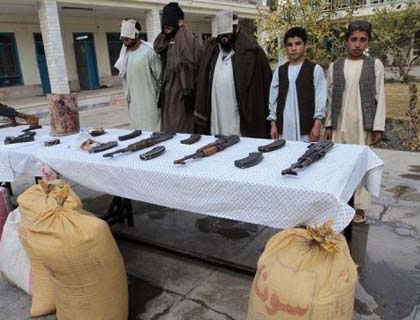The approach of Afghan government towards a wide range of issues is vague and confusing. It seems that the administration as a whole does not have any particular, dependable, long-term and dilemma-unraveling policies. There are no clearly defined policies to which public employees, civil servants, administrator and politicians stick and coordinate their activities and functions in a manner to get systematized and as whole achieve certain objectives. In other words, there are sets of general objectives, but no clear policies and planning to achieve them. The policies fluctuate like the trembling, disturbed prices of consuming goods in the Kabul market. Just consider the fall and rise of gas and other fuels in Kabul city during last two months. Gas price has fluctuated between 50 to100 Afghani due to snow-fall and entrepreneur manipulation. Government policies have a similar condition now. They fall victim to minor changes.
See, for instance, government attitude toward Taliban militants and other insurgent groups. Sometimes, they are criticized on the strongest possible language, while some other time they are branded as dissent brothers. Moreover, due to temporary and individual based decision makings, there is confusion within the administration over how to deal with the problems and challenges. The severe syndrome can be understood from contradictory statements and remarks of high ranking officials. Those remarks are not sign of minor theoretical differences but go deep down to lack of defined approaches and policies.
Just consider the recent statements of National Security Advisor to President, Mr. Spanta, in regard to Taliban-led militants. In his exclusive interview with Tolo News, he said that Taliban were terrorist and murderer of Afghan people. He added that Taliban's aim was to impose medieval culture on the contemporary era and he would be ashamed of being part of the government if it tries to bring Taliban to power.
He further emphasized that Afghan government should not lose the war it's winning with Taliban's propaganda, which clearly and implicitly shows his believe over military solution to the ongoing security crisis. Seemingly, he remains committed to lasting political calculation in the country with emphasize on military means. Perhaps, he is not the only one to maintain so. There are experts who believe on military approaches to end violence in the country. They are arguing that the history shows only groups and factions with military might could rule and establish strong central government. Diplomacy and civil policies have not worked out.
So, on the basis of this argument, it is inferred that current challenges can be solved through so-called force and military might, the thing which national security advisor clearly pointed out in his interview with Tolo News.
On the other hand, circles within the and out of the administration, including President Karzai, opposes the motion and view that bullets and military ineffective in bringing peace and stability.
The strong reason is the engagement of foreign allies during past ten years which have cost billions of dollars but still Taliban-led insurgencies have remained as existential threat to government. So, the best option ahead is fundamental change in policies toward and Taliban and other insurgent groups.
To do so, President Karzai started to be at the forefront and asked foreign allies to accept a full authorized Afghan-led peace process in which he succeeded somehow. But the process has not moved on a smooth track at all. On Sept. 20, former President, leader of Jamiat-e-Islami, chairman of Peace Council High Commission, Mr. Burhanudin Rabbani was murdered in suicide bombing in his house.
The report of his assassination in his house shocked many and portrayed the ridiculousness of overall process.
His assassin was a Talib named Esmatullah, staying in a guest house in Kabul. Reportedly, he was in contact with High Peace Council through Rahmatullah Wahidyar, a former Taliban deputy minister for refugees and martyrs. The assassin, Mr. Esmatullah, was in contact with High Peace Council members for more than five months.
The assassination of former President brought the process into a complete halt as President Karzai clearly put the notion to start negotiation with Pakistan after the incident. But it was resumed once again with no clear agenda except release of Taliban prisoners to entice their leaders to start a serious negotiation. Though time and again reports released about joining of militants to peace process and welcomed by prestigious traditional Afghani cloth (Chapan) generally put on their shoulder with or by presence of a high-ranking officials, but no key figure has yet defected from Taliban leadership.
Moreover, there are reports of about those who released from prison joint once again insurgency and hold armed struggle to topple government.
The very recent report is about two young terrorists who were forgiven by Mr. President last year but recently captured once again while trying to carry out suicide bombings on NATO and Afghan security forces.
Those who acquitted directly by president, then it would be so difficult for security forces to follow and check their activities. And moreover there are no reports about activities of insurgents who have joined peace process. Would they really become an obedient citizen or continue their linkage with militants and work for them secretly.
So, after much efforts and struggle, it is agreed that Taliban can open an office in Qatar in order to talk with US and its allies instead of Afghan government which Taliban views unauthorized. While, President previously supported the opening of an office for Taliban and desired that the process remained under his control, National security advisor said that there was a political office for Taliban in Qatar a simple address through which direct engagement with authorized Taliban representatives were possible.
Anyhow, what is important is this that there is no due integration within the administration. Each official analyzes the current situation on the basis of their own interests and notion not from an integrated address—government. It is because there is no clear and defined policies and approach on the top.

